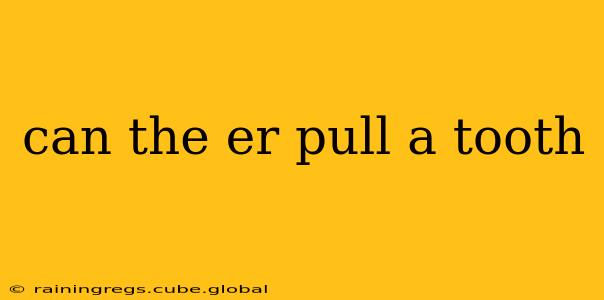Can an ER Pull a Tooth? Understanding Emergency Dental Care
The short answer is: sometimes, but not always. Emergency rooms (ERs) are designed to handle life-threatening situations and serious injuries. While they might extract a tooth in certain urgent circumstances, it's not their primary function, and they often lack the specialized equipment and expertise of a dentist.
This leads to a lot of questions, and we'll address the most common ones below.
What situations might lead an ER to pull a tooth?
An ER might extract a tooth if it's causing a severe, immediate threat to your health. This typically involves situations like:
- Severe trauma: A tooth is severely broken or dislodged due to an accident or injury, and there's significant bleeding or risk of infection.
- Severe infection (abscess): A significant infection with intense pain and swelling that needs immediate attention to prevent further complications. This might include a significant risk of spreading the infection.
- Tooth fragment obstructing airway: In the rare event a broken tooth fragment poses an immediate threat to breathing, the ER might remove it to secure the airway.
Why wouldn't an ER pull a tooth?
ERs prioritize life-threatening situations. Many dental issues, even if painful, don't meet this urgency. Here's why they often refer patients to a dentist:
- Lack of specialized equipment: Dentists have specialized tools and techniques for precise tooth extraction, minimizing damage to surrounding tissues. ERs often lack these tools.
- Focus on emergency medicine: ER doctors are trained in emergency medicine, not dentistry. While they can perform basic extractions in urgent cases, they’re not equipped to handle complex dental procedures.
- Risk of complications: Improper tooth extraction can lead to complications such as dry socket, infection, or nerve damage. Dentists are trained to minimize these risks.
- Post-extraction care: Dentists provide post-extraction care instructions crucial for proper healing. ERs don't have the time or resources for comprehensive follow-up.
What should I do if I have a severe toothache or dental emergency?
If you have a dental emergency, your first step should be contacting a dentist or emergency dental service. Many dentists offer emergency appointments, providing immediate attention and specialized care.
Only go to the ER if:
- You have severe bleeding that you cannot control.
- You are experiencing severe pain accompanied by other symptoms suggesting a serious medical condition.
- You have a tooth fragment blocking your airway.
What are the alternatives to going to the ER for a toothache?
There are several alternatives you can consider before heading to the ER:
- Contact your dentist: Most dentists have emergency protocols in place.
- Use over-the-counter pain relievers: Ibuprofen or acetaminophen can help manage pain until you see a dentist.
- Apply a cold compress: This can reduce swelling and pain.
- Use dental floss or a soft toothbrush to remove any lodged food: Gentle cleaning may alleviate some discomfort.
In conclusion, while an ER might extract a tooth in a true life-threatening emergency, it's crucial to remember that it's not a substitute for a dentist. For most dental issues, seeking professional dental care is the best course of action. Contacting a dentist or emergency dental service is always recommended before going to the ER for a toothache.
